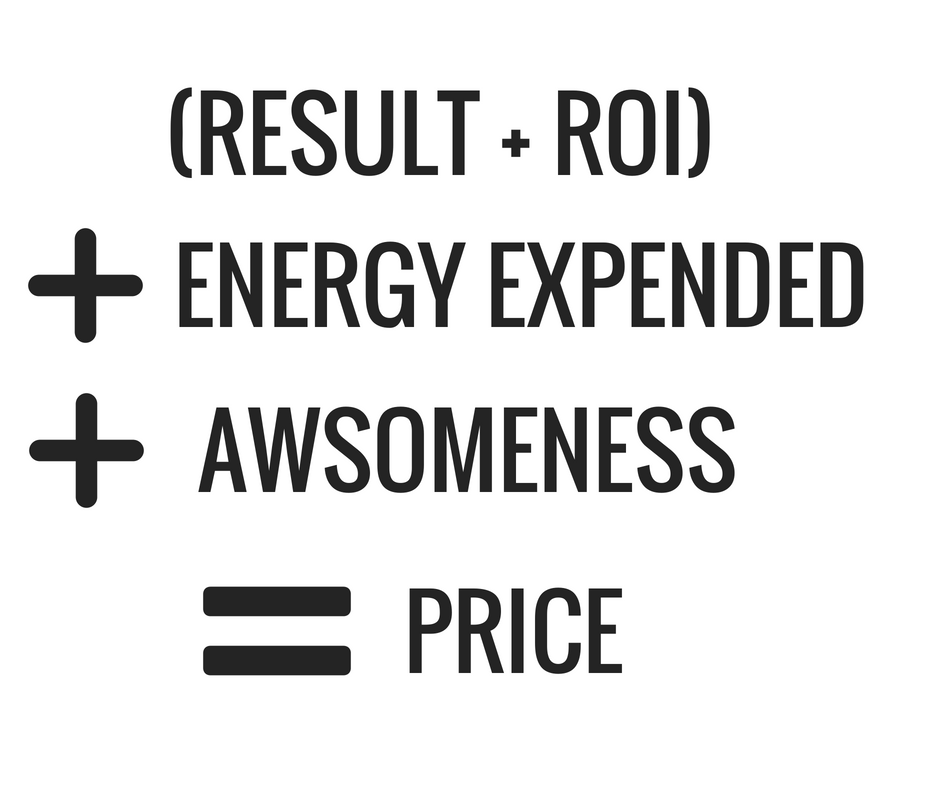
Price your services and charge your worth...
(The script from the video training on how to price your services and charge your worth)
One of the biggest questions that I get asked is how do I price my services?
Firstly,I have to say to you, it doesn't matter what I think you should charge or indeed what anyone else thinks you should charge.
It only matters what you think.
Because pricing is all in your head. It's a mindset game.
The biggest driving force behind your pricing is how much we believe that we're worth.
Write up continues below... (keep scrolling)
Sign up to my FREE Expert Unrivalled Membership and...
Gain full access to all my video training and informative articles on client attraction & conversion, business mindset miracles and business alignment specially designed for Coaches, Consultants & Experts so you can become the most desired option in your niche.
Understand what you bring to the table...
''Because your net worth will never be more than your self worth.''
So understanding what you bring to the table is vitally important.
Ask yourself... What's awesome about me? and genuinely answer it!
Part of pricing is owning your worth, owning your awesomeness, and knowing the value in which you bring to the table.
Which is why understanding your micro-niche, your specialism, your expertise, the result and return on investment that your client gets is really important to take into account when you're pricing your services.
It doesn't matter what I think, because if you think that you're charging too much, you'll hold back from selling your services.
You're going to be unconfident in how you come across, and in how you put those prices across when you tell people how much it is.
It's going to show in your energy.
It's going to show in the way you say it.
And if you charge too little, what you'll find is that actually you will start feeling resentful towards your clients.
You will start feeling like you might feel compelled to start cutting corners.
That where you may have once wanted to over deliver, you now do the bare minimum, because they've only paid a certain amount, and therefore you're not doing any more than you 'have to'.
Think about that from a customer perspective.
How that actually feels to be on the receiving end of somebody who is constantly pulling back and holding back on information and support because they feel cheated.
Isn't it far better to pay a higher amount and actually receive an excellent service, and that over delivers?
As a customer experience, that feels so much nicer.
And if you think about the lifetime value of your clients, keeping them happy and coming back for more is essential to a profitable business.
Getting clients is expensive! The amount you pay for a lead, whether that's in time and effort, or for a paid ad, or for however else it is that you get your clients it's costly and time consuming!
There's a lot of effort, time and energy, that goes into getting that client.
And so what we don't want to be doing is getting clients coming through the door and then pissing them off and them never buying from you again.
So realise that by undercharging, you're actually doing your clients a disservice.
The amount you charge for your services, has to feel good.
It has to feel worth it.
And I'm gonna take you through a process in a second, that's going to show you how you calculate your prices, in perhaps a sightly unorthodox way but one that has worked for me and many of my clients.
No more charging time for money...
If you are currently charging for time, that needs to stop.
Yes it needs to be taken into account, but it's not the main
factor that you charge for.
People don't pay for your time and actually your time is the most precious thing you own.
It's not about paying for the time. It's about paying for the results.
And it's however long it takes to get that result, is how long it takes; no more, no less. (unless of course you're selling purely a support/retainer package, but even then your result is that you're providing an insurance policy if they struggle, they're not purely paying for your time, even though I'm sure you're fun to be around.)
Don't feel that you have to pack a ton of extra time into something to make it feel worth more, because you don't have to do that.
It takes as long as it takes.
How long should a program be?
As long as it takes to get the result that you're promising.
So we wanna shift it over from time to results.
I'm gonna get the trusty white board out here, so I can show you what
we need to be doing.
So the first thing we need to be taking into account is...
What result are you getting for your client?
What result am I getting my clients?
It needs to be a solid result.
And in order to make it solid, you need to be asking yourself
'How will my client know when they've received the result?'
Now you need to be thinking about the return on investment of that result.
So what do I mean by return on investment?
I mean, what impact does it have on their business, their life, that that result gives them?
And think about the wider impact.
Think about their health, their mental health, their finances, their relationships with their family, with their friends, whoever that might be.
It's really important to take into account all of that, the result and the impact.
How much is that worth to your client?
How much is that worth to the right person?
Because the other thing to consider here is that to somebody who doesn't want that result or the return on investment, to them it's not worth much at all.
But think about the ideal client. The ideal client that wants those things.
How much is that worth to them?
That's how we start thinking about the kind of price we want to be charging for.
Now we need to start thinking about, what I like to call, this is where time can come into this, is the energy expended.
So you've got results and the ROI, now we wanna be starting to think about the energy expended.
Now the energy expended is to do with the time that you spend with your clients on calls, the support time that you are offering in between sessions.
If you are offering support time, how much access do they get?
What are the boundaries around that access?
When can they get a hold of you?
What's your response time?
How urgently can they get a hold of you?
How much access is there?
Think, take that into account as well.
Then you also wanna be thinking about perhaps any prep time.
It'll be different from business to business, but is there prep time
involved for each client?
Take that into account as well.
We also need to think about the level of support.
How much of you are you giving?
How much energy are you putting into this client?
We need to think about, and visualise, that process.
From the moment that they say 'yeah, this is what I want', and they've signed the contracts, and whatever else and you're about to go ahead - visualise that process of taking them through your process of the access that they get, the support to go through those calls, the results that they're getting along the way, the process - all of that.
The system that you go through.
Really visualize it.
Physically close your eyes.
Close your eyes and really take yourselfthrough the paces of
what that client will be being taken through and the level of support and energy expended on your part, on what that includes, okay?
So we're looking at the result, the return investment, we're
looking at the energy expended.
Now there's one more thing that we also need to
take into account here...
Let's just call it awesomeness!
So we need to take that into account.
Now awesomeness, what do I mean by this?
I'm talking about your experience in the area that you're helping
them to achieve the result.
So how awesome are you?
If you have qualifications, that's part of your awesomeness.
You've spent time and money investing in training that has helped you to increase your awesomeness.
Think about the experiences that you've been through, the hell and back, which has created how awesome you are right now.
We need to take into account all of that back story as well, to really own our worth.
To really start to realize what we bring to the table.
Writing down all of your qualities and attributes that help them achieve that result.
Writing down all of the experience, qualifications, training
that you've been through that helps them achieve that result.
We have to take into account all of those things...
And that equals your price.
So what I want you to do is I want you to actually think about a price right now.
And I want you to write it down.
Then I want you to question it.
I want you to really think about everything we've just gone through, and visualizing that whole process (after you've done the prep work.)
You've got to have done the prep work first on understanding everything we've just been talking about, as well.
You need to write down the prep for the result you're giving them, the return on investment, the energy expended - really go through that
strategic thinking.
What are you giving somebody?
Once you have your figure written down, close your eyes and ask yourself-
'How good does that make me feel?'
Would I feel ripped off if I was to get that amount?
Or would that amount make me feel comfortable?
And this is where it
gets a bit shady right, because when we start
charging more for our services it's always gonna have that moment of 'eeeek'.
The amount of people I've run
pricing talks in the past, and the following month I
had the same people come back and they were like, 'I did it'.
But the feelings that they went through when they did it...
(This one person did it through an email.)
And so she said 'I wrote down the price in the email'
And she was like... 'and then I edited it
deleted it and rewrote it again.'
And finally she pressed send.
And it was that moment of 'holy cheeseballs, I just asked for more than I've ever asked for!'
And apparently this person took two days to come back to them, and when they did they were like yeah, sure, no worries, let's go ahead.
And she was over the moon.
She was over the moon, but it was still scary.
So it's not going to feel totally 100% comfortable.
And you do have to build your courage up ever so slightly.
And I'm very careful when I say this, because a lot of people out there will say that raising your prices means that you have to take a bravery pill.
And I'm not too comfortable
with that analogy because it assumes that you are charging beyond your worth. And you're not doing that.
What I want you to do is really feel into it.
Really own your worth.
And truly charging for that.
But it will still feel like you do... okay let's compromise here, you're gonna take half a bravery pill, right?
You're gonna have to have that uncomfortableness of doing something new that you haven't done before.
It's the uncomfortableness of never having asked for this amount before.
The anticipation of how will it be received?
It will feel uncomfortable.
But as long as you know, with every fibre of your being, that you are worth that amount.
There is no haggling, there is no discounting, it is what it is.
And if they truly, truly can't afford it, which by the way, is very rare.
When people say they can't afford something it generally means that
you haven't demonstrated the transformation and value enough or they're not your ideal client.
But if they truly, truly can't afford it, then you can go back and say okay, so what's your budget?
And what else can I do for you instead that will help you progress from where you are right now?
You're not offering the same package, because that's worth what it's worth.
But you can maybe do something slightly different for them that's within the means that they can afford.
So, think about all of that.
Think about the visualization.
Think about what they're receiving.
Think about your energy expended.
Your worth.
And write that number down.
And then just test yourself, just increase it slightly and see how that makes you feel.
Keep increasing it and just see how it feels inside of your body.
And you'll get to a point where you're like, 'that's the number'.
That's as far as it's at for it to feel good.
And it doesn't matter what that number is.
It doesn't matter what anyone else thinks.
You have to feel good about it.
But do know this, if you price cheaply, you will be associated with that price.
And just to tell you a little bit of a story...
I helped my other half start up his business and I occasionally wade in with a bit of business coaching.
And getting him to raise his prices has been an ongoing battle for a while.
He finally raised them, and by a significant amount, and he actually found that as soon as he did it he got more bookings.
And the reason is, is because his prospects were looking at the competitors in the market and wondering why he was so cheap.
He was going along the lines of 'oh because we're cheaper, therefore, we'll scoop up the rest of the people.'
But actually people are skeptical.
They're like, 'well hang on a minute, why are you so much cheaper
than everybody else around?'
'What am I not getting?'
That means that the cheap price makes people uneasy.
So whilst, and this is very important, whilst I say don't compare yourself to other people's pricing points, what I'm saying is, is don't use their pricing point as a marker for yours.
It depends on the type of business that you're in.
For instance, airlines, okay.
There are comapnies like RyanAir,
And, I think it's Southwest airlines, I think, forgive me if I'm wrong, in the US, who are very, very successful and they both position themselves as the low fare airline.
And everything they do is stripped back to the bare minimum so that they can supply a low fare, but that's because their customers, don't care about the fancy meals.
They don't care about the business class stuff.
They care about getting to A to B, as cheaply and as quickly as possible.
That's what they care about.
They don't want to have to pay through the nose because they don't care about all that other stuff.
They just care about getting to where they need to go for as little money as possible, right?
So that works for that kind of business.
But ask yourself, does that work for your type of business?
Is that for you?
Andy's clients, they didn't want to do it on the cheap.
His ideal client is not a backpacker.
By the way, he's an adventure travel company helping people
up to Everest base camp.
But it's a scary thing going to Everest base camp.
It's nerve racking.
They've got a lot of questions.
There is danger involved with it, if you don't do it properly.
So for them, it's not about just doing it as cheaply as possible,
it's about peace of mind.
It's about making sure that they're looked after.
That they're with a trusted company that makes sure that their travel arrangements are sorted, that they have somewhere to sleep. That they're fed. That they're not going to die up there, right?
They associate the cost with being looked after. So cheap doesn't work.
And so you need to discuss with yourself how you want to position yourself. That does have to come into it.
Don't be looking at other people and what their price is of, because you don't know their mindset.
They could be the most... and this is the thing... you could look at them and go 'wow, they're awesome and they're only charging that amount.'
Well, that's up to them.
You know, you might see their awesomeness, but do they?
Are they owning it?
Are they charging their worth?
And pricing, you know, from the outside there is a perception.
People are skeptical.
People are savvy, people do question why things cost the way they do.
So have a good thing about that and take all of that into account when you're thinking about pricing your services.
I hope that helps.''
Work with Jen...
If you'd like to discuss how you can build your tribe full of the right people through finding clarity on your coaching niche and on who you serve so you can monetise your unique skills, then just book a call with Jen Hall here bit.ly/ClarityCallJenHall
Other training you may find useful...
Click here to watch the training on 'How to Attract High Paying Clients'

